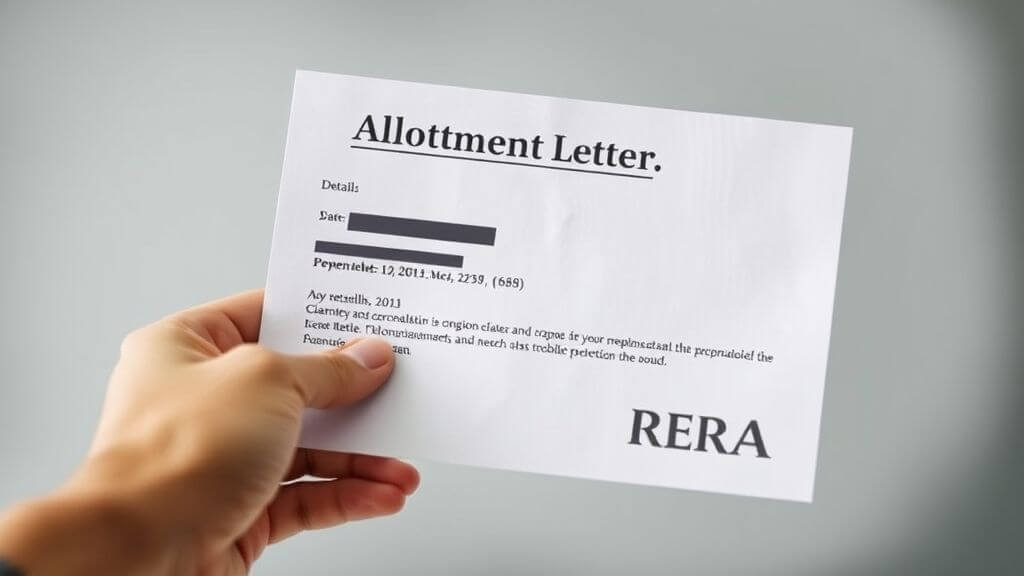
RERA Compliance: Why Promoters Must Issue Allotment Letters After Booking (By CA Lalit Pawar)
In the realm of real estate, transparency and clarity are paramount, especially when it comes to transactions between promoters (developers) and homebuyers. The Real Estate (Regulation and Development) Act, 2016 (RERA), underscores the importance of formalizing the booking process through the issuance of an Allotment Letter. As a Chartered Accountant and RERA consultant, I, CA Lalit Pawar, often counsel promoters on the significance of this seemingly simple yet crucial document. Let’s delve into why promoters must issue an Allotment Letter to homebuyers after a booking is confirmed.
✉️ What is an Allotment Letter?
An Allotment Letter is a formal document issued by the promoter to the homebuyer after the booking of a property is confirmed. It serves as an acknowledgment of the booking and outlines key details of the transaction. It is one of the primary documents establishing the relationship between the promoter and the homebuyer.
Key Information Contained in an Allotment Letter:
- Name and Address of the Promoter and Homebuyer 🏢
- Project Name and Location 📍
- Property Details (Unit Number, Floor, Area) 📏
- Total Sale Price 💰
- Payment Schedule 📅
- Booking Amount Paid 💵
- Terms and Conditions of Allotment 📜
RERA’s Mandate: Ensuring Formalization and Transparency
While RERA doesn’t explicitly define the format of the Allotment Letter, it implicitly requires its issuance as evidence of a confirmed booking. This is because RERA emphasizes transparency and formal documentation at every stage of the property transaction. By mandating project registration and disclosure of information, RERA inherently expects promoters to issue formal documents like the Allotment Letter.
Why is Issuing an Allotment Letter Important?
- Formalizing the Agreement: The Allotment Letter formalizes the agreement between the promoter and the homebuyer, providing a written record of the booking.
- Establishing Legal Rights: It establishes the homebuyer’s right to the allotted property, subject to the terms and conditions outlined in the letter and the subsequent Agreement for Sale.
- Providing Clarity and Certainty: It provides clarity and certainty regarding the property details, payment schedule, and other important aspects of the transaction.
- Facilitating Further Transactions: The Allotment Letter is a crucial document for further transactions, such as applying for a home loan or executing the Agreement for Sale.
- Serving as Evidence in Disputes: It serves as important evidence in case of disputes between the promoter and the homebuyer.
Best Practices for Issuing Allotment Letters:
- Issue the Allotment Letter promptly after the booking is confirmed.
- Ensure that all the details in the letter are accurate and complete.
- Include all the terms and conditions of the allotment in clear and concise language.
- Obtain acknowledgment from the homebuyer upon receipt of the Allotment Letter.
- Maintain a record of all Allotment Letters issued.
The Relationship Between Allotment Letter and Agreement for Sale:
It’s crucial to understand that the Allotment Letter is not a substitute for the Agreement for Sale (AFS). The AFS is a more detailed and comprehensive document that legally binds the promoter and the homebuyer. The Allotment Letter is issued at the initial stage of the transaction, while the AFS is typically executed later, after the homebuyer has paid more than 10% of the property price.
Conclusion: A Small Step, a Giant Leap for Transparency
The practice of issuing Allotment Letters after booking confirmation might seem like a small step, but it represents a giant leap towards greater transparency and accountability in the real estate sector. By adhering to this practice, promoters can build trust with homebuyers, foster positive relationships, and contribute to a more ethical and sustainable industry.
For More information, please refer original order @ MahaRERA Website:
Blog by CA Lalit Pawar
promoter must issue Allotment Letter to Home buyer after booking confirmed
Disclaimer: This blog provides general information about the importance of Allotment Letters under RERA. For specific legal advice and guidance related to your situation, please consult with a RERA expert or refer to the official MAHARERA website (maharera.maharashtra.gov.in).
Note: As per ICAI guidelines, please remember that this content is for informational purposes only and does not constitute professional advice. Consult a qualified professional for specific guidance related to your situation.
